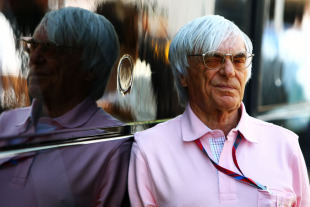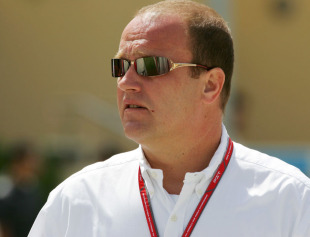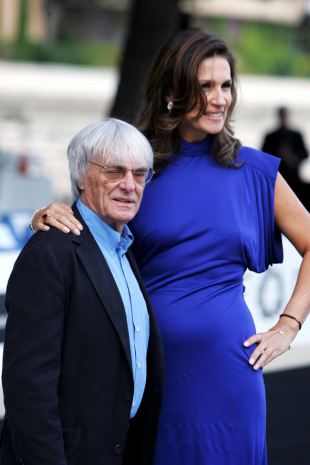- Formula Money
Why F1's former chairman was paid $45m

- News:
-
Bernie plays down Briatore's role in banker payment
- News:
-
Ecclestone denies bribery allegations
- News:
-
Prosecutors charge banker over F1 bribes
- Drivers:
- Bernie Ecclestone
It is one of the biggest corruption scandals in German history: Formula One's former chairman Gerhard Gribkowsky was charged last week with breach of trust, tax evasion and receiving $45m in allegedly corrupt payments. The money was paid to Gribkowsky's company GG Consulting in 2006 and 2007 and he was arrested in January when a German newspaper discovered that he had been paid the money. He failed to give a valid explanation for it and his former employer, state-owned bank BayernLB, claimed to be unaware of the payment. The German prosecutors believe it was paid in connection to shares BayernLB held in F1 but the latest details suggest otherwise.
BayernLB owned a 47.2% share in SLEC, the company which ran F1's commercial rights until 2006 when it was sold to current owner, private equity firm CVC. "The stake had been sold without being properly evaluated," said Barbara Stockinger, spokeswoman for the prosecutors, in January. CVC and F1's boss Bernie Ecclestone said they were innocent in the affair and it now seems that not only is he innocent but Ecclestone was a victim.
There are several reasons why it wasn't easy to see where the payments had come from and why. Firstly, Gribkowsky claimed that he was paid the money for consultancy work in F1 but there seemed to be little evidence of what he did. Secondly, the money was paid from two offshore companies - in Mauritius and the British Virgin Islands - so the payer could not be traced any further.
A now-defunct company in Mauritius, First Bridge Holding, paid an initial sum of $4m followed by $1.6m every month for ten months, commencing in August 2006. Likewise, Lewington Invest, a company in the British Virgin Islands, was reportedly due to pay a total of $25m in five equal instalments from August to October 2007.
The money was paid to GG Consulting which is based in Austria and this is at the heart of the tax evasion charge against Gribkowsky. The tax rate in Austria is 25% compared to 40% in Germany where Gribkowsky is resident. So since he did not pay the money in to an account in Germany, or declare it there, Gribkowsky has been accused of evading tax. GG Consulting was set up on 25 November 2005, the same day that CVC bought BayernLB's F1 stake, and this may be what started the prosecutors' train of thought which led them to the allegation that the shares were undervalued. Whilst it may seem to suggest a connection between F1 and the payment, the shares most certainly were not undervalued.

So why was the $45m paid?
On Tuesday the prosecutors claimed that Gribkowsky received the money from someone they named as "Bernard E" and a company owned by the Ecclestone family's offshore trust Bambino. Ecclestone doesn't deny it; instead he says he paid the money after Gribkowsky made false allegations about his relationship with Bambino and threatened to report them to the UK tax authorities.
At the same time as F1 was sold to CVC (which is also when GG Consulting was set up) the UK tax authorities were in the process of approving the creation of the trust. Ecclestone says that although he has "never had anything to do with the trust in any shape or form," Gribkowsky "threatened that he was going to say that I was running it."
In February 1996 Mr Ecclestone transferred his shares in F1 to Bambino as part of an estate planning exercise. He had suffered heart problems and if he had died, his Croatian ex-wife Slavica would have had to pay tax on her inheritance because she had not yet lived in the UK long enough to inherit tax free. Making the transfer to the trust solved this problem.
"I was advised to give the shares because at the time Slavica was non-domiciled because you have to be here 18 years to be domiciled," says Ecclestone adding "if I had died during that period, normally a wife could inherit money without paying tax but in that case she would have had to pay tax so the easy way to deal with it was give her the shares."
Ecclestone adds that "the [Inland] Revenue obviously had to check everything. It took five years going through that. I didn't deal with it. The trust had to show it was correct." This process was in full swing in 2005 since the trust received its first payment in 1999 - a $1.4bn loan secured on F1's future revenues. If Gribkowsky had followed through with his threat it could have derailed the process of setting up the trust and this was a risk Ecclestone did not want to run.
"The taxation people in England at the time were in the middle of settling everything with the trust and the last thing you need is for them to start thinking something different," says Ecclestone adding that Gribkowsky "was shaking me down and I didn't want to take a risk. Nothing was wrong with the trust. Nothing at all."
Ecclestone does not believe that Gribkowsky blackmailed him because "he never said to me if you don't give me this I will say that." Ecclestone says that Gribkowsky asked to borrow the money from him and implied that he would otherwise link him to Bambino.
Ecclestone says "what he did with me, he left me with the fact that could he do it or not." He adds that he asked his lawyers at the time "if this guy was to do that what would happen? They said, I tell you what would happen, the revenue would assess you and you would have to defend it, because you could defend it, and you would be three years in court and it would cost you a fortune. Better pay."

On Tuesday the prosecutors alleged that the $45m was "bribery money, whose payment was disguised through two fake consulting contracts with [companies] in Mauritius and the British Virgin Islands."
This indicates that they still seem to believe that the money was paid as a bribe for undervaluing BayernLB's F1 shares. It explains why, in addition to tax evasion, they have charged Gribkowsky with being in receipt of what they believe are corrupt payments. As BayernLB was not aware that Gribkowsky had received the $45m it explains why he has been charged with breach of trust. Furthermore, the prosecutors believe that Gribkowsky used BayernLB's funds to compensate for what they believe was a bribe.
They said on Tuesday that in addition to the payment to Gribkowsky, the banker agreed to pay $41.4m to Ecclestone on behalf of BayernLB, as well as $25m to Bambino. "These payments would not have been asked for were it not for the bribes to be paid to the accused," said the prosecutors adding that BayernLB "incurred damages of almost $66.5m through the conduct of the accused."
However, Ecclestone disputes this and says "I never bribed anybody or paid any money to anybody in connection with the company." He explains that the payment by BayernLB to him was not to compensate for the money he transferred to Gribkowsky but was in fact commission he received for arranging the sale to CVC.
"I got 5% for the sale of the company. BayernLB approved the sale and approved the commission, which was cheap. I should have got more because for that sort of deal a bank would have charged a lot more. But they approved that, the bank approved that. There were no secrets."
Ecclestone adds that not only did he facilitate the sale to CVC but he also gave BayernLB "an indemnity for an awful lot of money that all the accounts were in good order because the bank would not give them."
Until now, Ecclestone had denied making the payment and he explains that he did this because "the prosecutor had asked me not to say anything." The German court must now decide whether to open the case against Gribkowsky. Ecclestone has not been charged and says he is confident that he will be cleared of all accusations against him. His admission is at the core of this.

